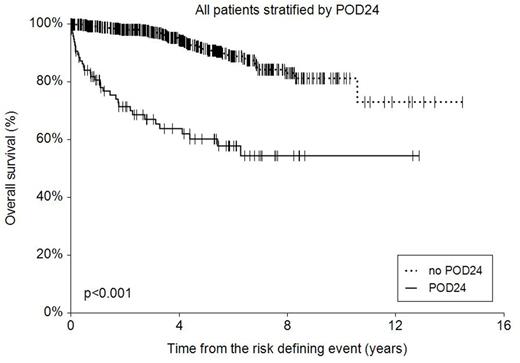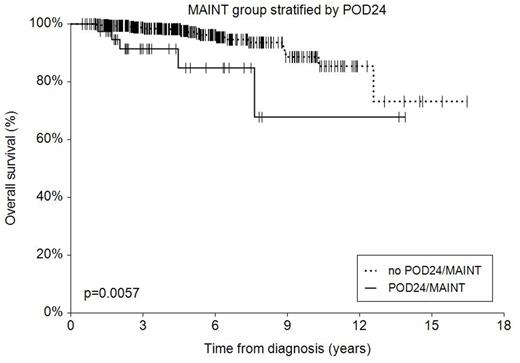Abstract
Background: Follicular lymphoma (FL) is an indolent lymphoma with chronically relapsing disease course. Treatment of relapses with 2nd line regimens such as salvage and autologous stem cell transplant (ASCT) is considered successful, i.e. the relapse itself does not shorten life expectancy. However, LymphoCare registry study (Casulo et al., JCO 2015) identified an early progression of the disease (POD24, i.e. progression within 24 months after R-CHOP commencement) to be a strong unfavorable event. Early progressors experienced only 50% 5-year OS compared to 90% in the control group) irrespective of the salvage treatment delivered. It is unclear whether post R-CHOP maintenance immunotherapy (MAINT) decreases POD24 incidence. Potential predictors identifying patients at risk of POD24 have not been analyzed yet.
Aims: (1) To analyze the impact of MAINT on POD24 occurrence, (2) to find clinically applicable predictors of POD24 at the time of FL diagnosis.
Methods: The Czech Lymphoma Study Group (CLSG) database was searched using the LymfoCare (LC) study methodology for previously untreated FL grade I-IIIa patients (pts), CS II-IV (Ann Arbor), no watch-and-wait before R-CHOP. Early progressors were defined as pts with progression or relapse within 24 months after FL diagnosis. OS was calculated both from diagnosis and from the Risk-defining event (rdOS) - it means from the date of early progression (POD group) or 24 months after diagnosis (non POD group). We have identified 821 FL pts, who met the inclusion criteria above and were diagnosed before DEC-2014. Median age of the CLSG group (58 years; range 26-82 years) was identical to the LC group (58 years; 22-88). Fifty-eight percent were females (46% in LC) and 50.5 % had high risk FLIPI (44% in LC). 80.8% of our pts had FL grade I-II and 19.2% had FL grade IIIa (62% and 38% in LC, respectively)
Results: Treatment response was available in all but 15 pts (99.9%): CR/CRu, PR and SD/PD was achieved in 70.0%, 25.5% and 4.5%, respectively. After median follow up of 5.02 years 244 (29.7%) pts relapsed or progressed and 101 (12.3%) of the pts died. Five year OS and progression-free survival (PFS) was 90.1% (95% CI 0.88-0.92) and 63.7% (95% CI 0.60-0.68), respectively. In total, 99 POD24 (12.3%) were identified in the whole cohort of 821 patients. Five-year OS without POD24 (93.8%) was superior to 5-year OS in the POD24 group (64.3%, p<0.001). Five year rdOS was 90.9% (no POD24) and 60.2% (POD24), p<0.001 (Figure 1), compared to 90% (no POD24) and 50% (POD24), p<0.001, in our study and LC study, respectively. POD24 was associated with reduced rdOS with a hazard ratio (HR) 5.83 (95% CI 3.73-9.14), compared to HR 7.17 (95% CI 4.83 to 10.65) in the LC study. MAINT was delivered to 525 (68.2%) of the 770 pts in the first CR/PR. Subanalysis of pts with maintenance was performed. Out of 525 MAINT pts POD24 was observed in 9% (40/525) and noPOD24 in 91% (485/525), respectively. OS probability at 5y was 84.8% for POD24/MAINT and 97.2% for those without POD24/MAINT, HR 3.75 (95% CI 1.37-10.2), p=0.0057 (Figure 2).
When analyzing 14 laboratory and clinical variables, the most of the predictors were significantly more frequent among POD24 - this was translated to more frequent H-FLIPI score (77% for POD24 vs 45% noPOD24, p<0.001), we did not find any difference in bulky disease presence (65% vs 67%, p=0.71). A predictive model to identify patients at risk of POD24 was built by means of multivariate logistic regression. The final model included sex (male), CS IV, ECOG≥2, LDH>ULN, Leucocytes≥10exp3/uL, and hemoglobin<12.0 g/dL.
Conclusions: In high-tumor burden FL patients, early disease progression after R-CHOP is associated with almost 6 times higher risk of death, with 5years rdOS only 60.2%. Pts who achieve CR/PR and receive rituximab maintenance and experience early progression have still reduced OS probability (HR 3.75). On the other hand, pts on rituximab maintenance without early progression have extremely good prognosis with 97% probability to be alive at 5 years. We have proposed a prediction system to identify individuals at risk of POD24 who may profit from alternative treatment modalities.
Acknowledgment: Supported by IGA_LF_2016_001 and the Czech Ministry of Health AZV 16-31092A grants.
Prochazka:Takeda: Consultancy, Research Funding; Gilead: Consultancy, Speakers Bureau. Belada:Gilead: Consultancy, Honoraria, Research Funding; Roche: Consultancy, Honoraria, Research Funding; Janssen: Consultancy, Honoraria, Research Funding; Takeda: Consultancy, Honoraria, Research Funding. Trneny:Roche, Celgene: Research Funding; Roche, Celgene, Takeda, Janssen, Gilead, Bristol-Myers Squibb: Consultancy, Honoraria, Membership on an entity's Board of Directors or advisory committees.
Author notes
Asterisk with author names denotes non-ASH members.



This feature is available to Subscribers Only
Sign In or Create an Account Close Modal